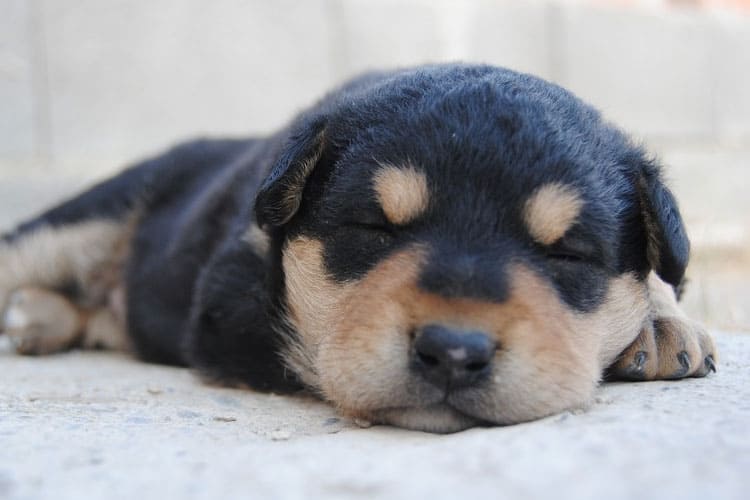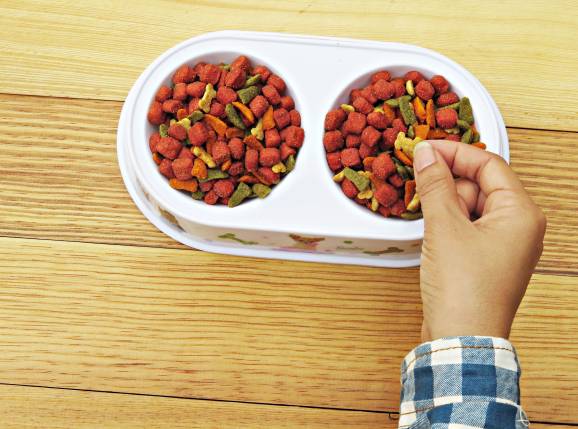If you’re the pet parent of a new puppy, we’d like to congratulate you! What a life you two will enjoy together as he grows! You’ll have all the fun of a new little fur baby learning his way around your home, learning to play with you, etc. There are many joys with having a new puppy in your home! However, with a new puppy there will be some issues you’ll have to deal with. Not only will the puppy chew on shoes (and more!) as he deals with teething, but he may also occasionally develop an upset tummy and/or diarrhea. We’ve put together this guide with information to help you cope with puppy diarrhea, along with remedies, information on when to the call the vet, and more.
Connect with a verified veterinarian in minutes. Licensed vets are available 24/7 to answer your questions. No need to worry about your furry family member.
Puppy Diarrhea is a Common Problem
Diarrhea in puppies is a very common problem, which can be caused by any number of health issues. Some of these are just mild, short-term health problems, while other causes of diarrhea in puppies can be quite serious, even life-threatening. There are numerous causes of puppy diarrhea, but here’s a list of the common reasons your baby dog could develop diarrhea:
- Stress
- Change in diet
- Bacterial infection
- Viral infection
- Parasites
- Eating something they shouldn’t (garbage, toxic substances, socks and other objects)
Let’s take a look at each of these common health issues in puppies.
Stress: when your puppy leaves his mom and siblings, it can be stressful. He doesn’t know what’s going to happen next, doesn’t know what to expect when he meets you and sees his new home, etc. This can cause stress in a puppy, which can lead to diarrhea. Put yourself in his shoes, so to speak! To help keep your puppy’s stress to a minimum, it is helpful to maintain a predictable schedule for feedings, exercise and nighttime sleeping. Also give your fur baby lots of love and attention, and make sure to keep things as calm as possible him in his home.
Change in diet: sometimes diarrhea in puppies can be caused by a new diet. Your little fur baby may have a sensitive tummy and/or have food sensitivities, food allergies, etc. Each of these can cause diarrhea. To keep from having this problem, make sure to keep your puppy on the same food he’s already eating when you get him. After he’s a little older, it will be possible to change him over to another food, with your vet’s guidance and advice.
Bacterial and viral infections: can cause diarrhea in puppies. In fact, these can be life-threatening illnesses for puppies. A puppy’s immune system is not yet strong enough or mature to take on some serious infections. Viral infections, such as distemper and parvovirus, can cause diarrhea in your puppy. There are vaccines available, but if your puppy hasn’t been vaccinated, then he could be in danger of catching one of these infections.
Parasites: intestinal parasites are another common cause of puppy diarrhea. These include roundworms, hookworms, whipworms, coccidia and giardia, which puppies can catch from their mothers after they’re born. Puppies can also become infected after being exposed outside to infected water or soil. There are medications to treat parasites available at your vet’s. While most parasite infections are easy to treat, some can be life-threatening. So, be sure to seek treatment from the vet as soon as possible if you suspect your puppy has this health issue.
Eating something they shouldn’t: puppies are curious about their surroundings, and use their mouths to experiment with objects, learning what tastes good or not, your pup may be teething and accidentally swallow an object. Puppies have been known to eat or accidentally swallow anything from parts of socks & shoes, to string, garbage items and more. They’ve also been known to swallow small parts of children’s toys. This can dangerous, as such items can cause an intestinal blockage or be toxic, both of which can be life-threatening. They can also cause diarrhea. To avoid these problems, be sure to keep your puppy’s surroundings free of anything that could dangerous for him if eaten or swallowed.
Make sure garbage and other items, including medications, are out of reach and inaccessible.
Signs & Symptoms of Puppy Diarrhea
OK, here we’ll have to get slightly graphic in details about your puppy’s poop. We’ll keep it from getting too gross—we promise! A puppy’s normal pooh should be cigar-shaped or log-shaped, and soft, but not runny. It will be somewhat solid, but not completely hard. On the other hand, if your puppy has diarrhea, his poop will be very soft, or possibly runny. You may also notice streaks of blood, or that it looks somewhat watery. It may seem gross, but it’s important to pay attention to your puppy’s poop so you can catch problems early, especially if you notice he’s having diarrhea.
Other signs and symptoms that may accompany the diarrhea can include:
- Lack of appetite or refusing to eat or drink
- Vomiting
- Fever
- Weakness
- Sleeps more often
- Pain
- Excessive gas
- Blood in stools
- Pale gums
- Any other changes in his poop (for instance, if they have yellow streaks, look black like tar or are a greenish color).

Review symptoms, medications & behavior to keep your pets healthy with a Vet Online in just minutes.
Ask a Vet Live NowHow to Treat Diarrhea in Puppies
If your puppy’s had diarrhea for more than a day, it’s a good idea to contact the vet and ask for their advice on how to treat it. When you call the vet, they’ll ask what signs or symptoms the puppy has, and they may ask questions to see if your puppy’s eaten something he shouldn’t, if he has a fever, etc. Be sure to explain all the signs and symptoms your puppy’s having in order to provide the vet with the information they need. The vet will advise you on how to treat your puppy’s diarrhea. Be sure to follow their instructions carefully and call them again if your puppy’s not better in a day or two. The treatment will depend on what’s causing the diarrhea. If your fur baby’s diarrhea is severe, it may be necessary to hospitalize him for a few days, until he’s feeling better. Treatment may include supportive IV fluids, antibiotics (to treat infections), etc. If your puppy has an obstruction in his intestines, surgery may be needed to clear the blockage.
If your puppy is diagnosed with a parasite, then treatment will be given to rid your little canine companion of this infection.
Common Questions About Diarrhea in Puppies
In this section, we’ll take a look at some of the common questions about diarrhea in puppies.
1). How to treat puppy diarrhea and vomiting?
If your puppy has a mild bout of diarrhea accompanied with vomiting, it’s not necessary to call the vet right away (unless you’re very worried). If your puppy has diarrhea but still playful and bright, it may just be a short-term bug or stress. You can treat this by withholding food for 12 to 24 hours (no longer than that), but make sure your puppy has access to clean water at all times. Some vets advise giving your puppy warm water as it may be better tolerated. If you do this, make sure the water is only warm, not hot. The water should feel comfortable to your touch. It’s a bit like making a baby bottle for an infant—you don’t want to burn the baby’s mouth…rather, the puppy’s mouth, in this case!
If he’s still having diarrhea after 24-48 hours, then be sure to call the vet. The vet may be able to prescribe treatment over the phone, or he may ask you to bring the puppy in to be checked. Or the vet may advise you to put the puppy on a bland diet of cooked white rice and salt-free chicken broth for a specified time. The rice can help soak up excess liquid in your puppy’s digestive system, while the broth makes the rice taste better and adds a little liquid to keep him hydrated. If your puppy’s showing the following symptoms along with diarrhea and vomiting, then it’s time call the vet as soon as possible:
- Lethargy & not interested in playing
- Abdomen appears painful and/or bloated
- Large amount of fluid with the vomiting or diarrhea
- Blood in the vomit or diarrhea
These are signs of a serious health issue and it’s important to call your vet as soon as possible.
2). What should I do if my puppy diarrhea at night?
This could be caused by something your puppy has eaten at some point during the day. Try the home remedies mentioned above before calling the vet, to see if that will stop the diarrhea. If this happens over the course of a couple of days but doesn’t improve, then it’s time to call the vet. You’ll probably be asked to bring your puppy in for a checkup to see what may be causing the problem.
3). Is there a puppy diarrhea home remedy?
Yes, as described earlier, you take your puppy off his regular food, if the diarrhea isn’t severe, and make up some white rice and low-sodium chicken broth to help stop the diarrhea and keep him hydrated. If the diarrhea is more like semi-solid poop, then you might try adding in pieces of chicken white meat (no bones) that have been boiled. You can also cut the chicken up into fine pieces, and then put them in a blender to puree the meat, which can then be added to the white rice and chicken broth dish.
You can also try adding small pieces of boiled sweet potato or pumpkin to your dog’s rice. These can be boiled and cut into fine pieces or pureed and then added to the rice. This can be given to your puppy until his pooh is back to a more solid consistency. If his diarrhea continues past 24-48 hours and/or becomes worse, then be sure to call the vet immediately.
4). Is there a way to cure puppy diarrhea fast?
The vet may advise you to give your puppy giving your puppy either Pepto-Bismol or Kaopectate, both of which are anti-diarrheal treatments for humans. Only give these medications to your puppy if advised to do so by the vet. And give your puppy the prescribed amount of the medication—not more or less, and only give it as often as the vet advises. As you can see, diarrhea can be a common health issue in puppies; it can also be mild or serious. If your little fur baby develops diarrhea, but seems otherwise OK, then it will probably be short-lived, and your puppy will be OK. However, if the diarrhea doesn’t respond to home treatment after 24-48 hours, or if it suddenly worsens (see the symptoms noted earlier), then be sure to call the vet immediately. Puppies need your help as soon as possible when they’re sick. Quick and early treatment can save your puppy’s life.
We hope this helps you and your puppy get rid of any diarrhea issues fast, and we hope your little fur baby will soon feel better!
Connect with a verified veterinarian in minutes. Licensed vets are available 24/7 to answer your questions. No need to worry about your furry family member.

Tom
Tom has always loved to write since he was little - he wanted to be either a writer or a veterinary doctor, but he ended up being a professional writer while most of his works are based on animals. He was born in San Francisco but later moved to Texas to continue his job as a writer. He graduated from the University of San Francisco where he studied biotechnology. He is happily married and a soon to be father!
Review symptoms, medications & behavior to keep your pets healthy with a Vet Online in just minutes.
Ask a Vet Live Now



